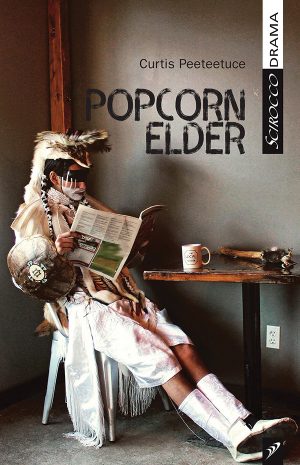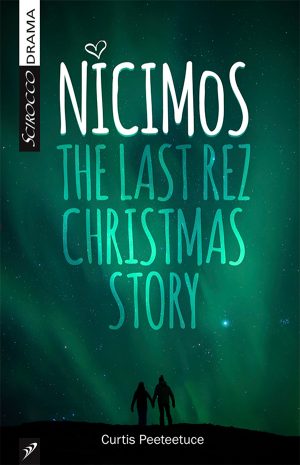Posted December 4, 2023
The Interview – Curtis Peeteetuce
Curtis Peeteetuce
Curtis Peeteetuce is Cree from the Beardy’s & Okemasis First Nation. He is a performer and writer who works in theatre, radio drama, music and film. His plays include the the popular Rez Christmas story series, which ran for twelve years in Saskatoon, and Popcorn Elder. Peeteetuce won the Saskatoon and Area Theatre Award for Outstanding Male Performance for the role of Floyd in Where the Blood Mixes, and has been nominated as a playwright and sound designer. Curtis dedicates all his accomplishments to his beautiful son Mahihkan.
Curtis, you are a playwright, a director, an actor, a musician, a dancer, a teacher—a lot of roles that relate to storytelling. Why do you think story is so important to our lives?
The most important story to me is the first story. Not the story of creation, the first drum, the great flood, Adam and Eve or even God. It is the story of us. That story is the foundation of who we are…as individuals and as human beings.
In 2020, you were selected to be the writer-in-residence at Wanuskewin, the Saskatchewan heritage park that has been a sacred gathering place for Northern Plains Indigenous people for thousands of years. What was it like to spend time there during the pandemic?
My residency for Wanuskewin was known as a quarantine within a quarantine. I gathered two weeks of food and all my materials and lived fourteen days in the gallery. In that time I wrote a new science fiction short, digitized my vinyl collection, completed ten paintings, wrote new music, and edited one of the rez Christmas plays for production.
The whole residency was captured on a timeline by a friend who planted his camera in the gallery. On a daily basis I streamed YouTube sessions with members of the community, just to get an idea how others were handling the pandemic and what they were doing to keep positive and busy. I would have to say it was important to keep as busy as possible. With multiple artistic projects to take on, the time spent in the gallery did not seem as long, although it was nice to go back home to my cat.
In the Regina Leader-Post, you were once quoted as saying, “…when we are engaging and moving forward with reconciliation, we need to also create this awareness of stories, of things we don’t necessarily want to hear, discussions that we necessarily find difficult to have, and also issues that we don’t have a strong awareness of.” Can you expand on that, with regard to your own work?
I’ve drafted a few replies to this question and cannot find a way to answer it in a way that won’t seem offensive or bitter. I’m pretty much retired now, but in my last years as a theatre artist, I became disillusioned by what it is we are doing in the arts. There are times I’ve wondered why people are doing reconciliation. I can only think that certain individuals did it because of a mortgage, threat of funding being pulled or to check this off the list. I’ve also witnessed individuals and organizations taking advantage of reconciliation not for the greater good or community, but for their own reasons. So to revisit my quote and answer your question reminds me of how much it hurt at the time, because it’s true.
Your play Popcorn Elder examines, among other issues, the relationship between a father and son, formerly estranged, who are struggling to reconnect. Although the stakes are high and the subject matter is serious, there are also many funny moments in the play. What role does humour play in your work?
I believe Indigenous people have a natural sense of humour. It’s a part of our everyday lives and has carried us through very enduring and struggling times in our history. My mentor Kennetch Charlette always said, “If you’re honest, the humour will come on its own.” In my early years as a writer, I always tried to write comedically. It never worked. Once I was honest in the storytelling, I was reminded of people in my life who were instrumental in keeping things real with a funny one-liner, a comment or a memory. So in that way, humour carries an audience though elements of storytelling that are heavy, serious or dark.
Curtis, recently you have been working mainly with students and youth. What forms does this work take, and what do you find rewarding about it?
I’ve been in the arts for 20+ years. I’m at an age now where those before me have either moved on and retired or have passed on. Celebrities, allies, friends and family. When I think about my own life and what I want to leave behind, it excites me that even at my age there is still a journey ahead and things to do. For me, working with young people in education is so meaningful. Every day ends with something positive that I can say I was a part of.
It is December, and we would be remiss if we didn’t ask you about the famous rez Christmas story series, which includes Nicimos, published by Scirocco Drama. Can you tell us a little about the history of the series and about some of its unforgettable characters?
I’m very proud of the rez Christmas series. It’s funny to me that none of the plays in the series actually have anything to do with Christmas, but more so about the stories of three golden girls on the rez during the holiday season. The themes of the stories are simply family, friendship, and love. The only thing was borrowing from existing Christmas stories to bring the people in. For example, How the Chief Stole Christmas, Kohkoms in Toyland and Luff Actually are among my favourites. The one distinct characteristic about the series for me is the humour. There is nothing like hearing the belly laughter of a theatre full of over 400 people. That is just pure medicine. I’ve heard laughter in other shows, of course, but nothing like the storytelling antics that Sihkos Sinclare, Clare Bear and Zula Merasty bring at this time of the year. It is a shame that producers across the country have not yet experienced the power of Indigenous storytelling and humour. It is my hope that one day the rez Christmas series will be produced in other parts of the country. I happen to believe Christmas is a very hard time. Shopping, cooking, travel can be stressful, so having a good laugh with family and friends can take care of those stresses, no problem. The stories are not only about humour, but about community, with hints of culture, language and history. I have nothing but gratitude for all the people over 20+ years that have supported the rez Christmas story series. Nanaskimonawaw.
-
 Popcorn Elder$9.99 – $15.95
Popcorn Elder$9.99 – $15.95 -
 Nicimos: The Final Rez Christmas Story$9.99 – $15.95
Nicimos: The Final Rez Christmas Story$9.99 – $15.95

